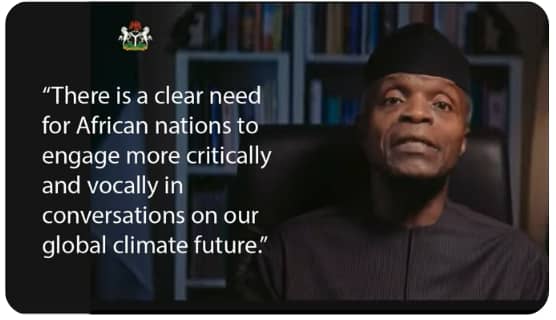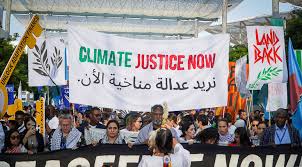* $410 Billion to deliver Energy Transtion by 2060
* Complementary Launch of Universal Energy Grant Facility
* Solar Companies urged to participate
Nigeria’s Vice President, His Excellency, Prof Yemi Osinbajo is leading efforts towards an energy and development renaissance; as he led critical stakeholders, earlier today to inaugurate the Nigeria Energy Transition Plan.
The Energy Transition Plan is a focused drive by the Nigerian Government to take ownership of her transition pathways and design climate sensitive strategies that would address Nigeria’s growth objectives.
Addressing the damaging effects of climate change in Africa, which threatens agriculture and crop productivity, creating increased food insecurity and worsening unemployment; Osinbajo stated that it is time for Africa to take decisive action and rise to the challenge.
However, for this to happen, Africa must address its huge energy deficits with the Vice President highlighting the massive resources needed for Nigeria to become energy secure and attain its development and climate ambitions.
“Nigeria would need to spend $410 billion above business-as-usual spending to deliver the transition plan by 2060”, says the Vice President.
“This translates into about $10billion a year. The Average $3billion per year investments in renewable energy recorded for the whole of Africa between 2000 and 2020 will certainly not suffice”
According to Osinbajo ‘With the Inter-ministerial Energy Transition Implementation Working Group, we are currently engaging with partners to secure an initial $10billion support package ahead of COP27 along the lines of the South African Just Energy Transition Partnership announced at COP26 in Glasgow”.
In addition, says Osinbajo, the Nigerian government is implementing power sector initiatives and reforms focused on expanding the grid, increasing generation capacity and deploying renewable energy to rural and underserved populations.
This will support the key objectives of the plan which was designed to tackle the dual crises of energy poverty and climate change and deliver SDG7 by 2030 and net-zero by 2060.
Osinbajo also recognized the role of Natural Gas in this plan; to facilitate the establishment of baseload energy capacity and address Nigeria’s clean cooking deficit as well as LPG utilization.
The plan will also create about 340,000 jobs by 2030, and 840,000 by 2060 and presents a unique opportunity to contribute towards lifting 100million Nigerians out of poverty in a decade.
This will also drive economic growth, bringing modern energy energy services to the full population and managing the expected long term job loss in the oil sector due to global decarbonization.
Complementing the Transition Plan, the Vice President also announced the launch of the Universal Energy Grant Facility (UEGF).
“This is a results based finance programme that focuses specifically on scaling up electricity access for productive uses. And I encourage Solar companies in attendance today to engage with this innovative financing opportunity”
This announcement was complemented by other speakers at the Launch, including the Nigeria Country Director, World Bank, Mr Shubham Chaudhri, , who said the bank intends to commit over $1.5 billion towards the Energy Transition Plan.
“We plan to commit over $1.5 Billion towards the Energy Transition Plan on renewable energy, on power sector reforms, and potentially hydropower, on clean cooking, and wherever opportunities arise,” he said.
Adam Cortese, CEO of Sun Africa, disclosed that his company had over 1GW of renewable energy projects in the pipeline in Nigeria.
He revealed that Sun Africa, emboldened by the Energy Transition Plan was in the final stages of discussion with US Exim Bank on a USD 1.5 billion financing package.
Applauding the timely launch of the Energy Transition Plan, remarks from other speakers reiterated the need to strategically harness the multiple possibilities achievable through universal energy access across Africa; building on existing initiatives to achieve coherence and integration within African countries, including youth in the discourse and translating the plan into action for the sustainable growth of Nigeria.
The Vice President was joined by those from the international community including the Chief Executive of Sustainable Energy For All, anchors of the ETP, Ms Damilola Ogunbiyi; Deputy Secretary-General of the UN, Amina J. Mohammed; UNDP Regional Director for Africa, Ms Ahunna Eziakonwa; Special Envoy for Climate Ambition and Solutions, Michael Bloomberg; Vice President for Africa, International Finance Corporation, Sergio Pimenta; Minister of Petroleum and Energies from Senegal, Sophie Gladima and Minister of Electricity and Renewable Energy from Egypt, Mohamed El-Markabi.
Speakers from Nigeria included the Ministers of Environment, Mohammed Abdullahi; Power, Abubakar Aliyu; Works and Housing, Babatunde Fashola; Finance, Budget and National Planning, Zainab Ahmed; Managing Director, Rural Electrification Agency, Ahmad Salihijo; Youth Climate Activist, Olumide Idowu; and Research and Communications Associate, Energy Transition Office, Gbemi Akinsipe.
Others included representatives from AFDB, Global Energy Alliance for Planet and Prosperity and Rockefeller Foundation.







